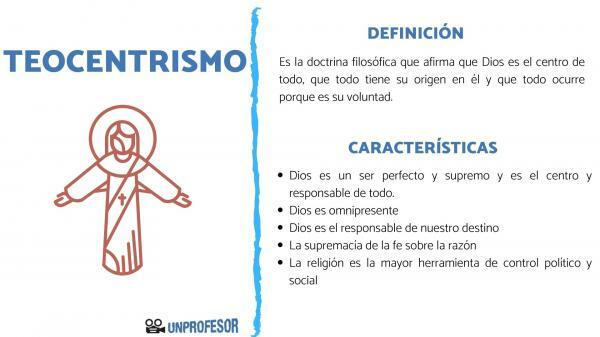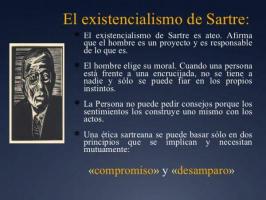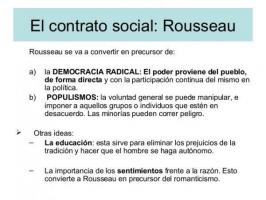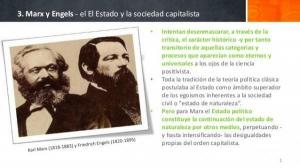THEOCENTRISM: meaning and characteristics

In today's lesson we are going to explain the meaning and characteristics of theocentrism. Doctrine that states that divinity is the center of the universe, the creator of all and the one that directs everything that happens in the world, including the destiny of human beings or reason.
Theocentrism was of great importance during the Middle Ages Europe, when the Church enjoyed great power and when this current was supported by the catholic monarchies. Thus, it became the predominant doctrine of medieval Christian philosophical thought, being its highest representative Saint Thomas Aquinas (1224-1274).
However, theocentrism gradually declined, until the Modern Age / Renaissance began to impose the anthropocentrism, according to which the human being is the center of the universe. If you want to know more about theocentrism, continue reading this article by a PROFESSOR.
To know what the meaning of theocentrism is, we first have to analyze the word itself, that is, its etymology. In this way, we find that theocentrism is the result of the
union of three Greek words: theos= god, ketron= center e ism= doctrine.Thus, as the word itself indicates, theocentrism is the philosophical doctrine that states that God is the center of everything, that everything has its origin in him and that everything happens because it is his will. He is director and executor, since everything happens according to divine laws and his designs.
Therefore, theocentrism explains everything through the figure and action of God: the creation of the universe, natural phenomena, life, our behavior and actions... Everything revolves around God and, therefore, everything is crossed by religion: thought, science, politics and society.
Theocentrism had its period of greatest splendor during the Middle Ages (10th-13th century), at a time when the power of the Church was very strong and which was characterized by:
- The world was divided into two areas: Christianity and the rest, where practitioners of erroneous creeds resided. Hence, the reason and justification for the expansion and consolidation of Christian kingdoms on "unfaithful" territories.
- The Church was the institution in chargeto guide the human being on the right path: one had to live close to God and according to his designs.
- The Church, through its institutionalization, created a centralized monarchya, whose head was the pope and who spread throughout Christendom through ecclesiastical geography: archbishopric, archpriesthood, diocese... That is, he had "fiefdoms" and vassals.
- Society was divided between the sacred (the clergy) and the profane (laity).
- Political Augustinianism: according political Augustinianism the Church was morally superior to the "State", because all power comes from God. Thus, a theocracy where the Church is the soul and the State is the body.
One of the main representatives of theocentric philosophy was the Italian theologian and philosopher Saint Thomas of Aquino (1224-1274). For him, everything exists through God, therefore, everything would be subject to his figure and his theology (systematic theology), which is the one that studies God and allows us to reach him.
Likewise, one of the key points of his theocentric philosophy will be the demonstration of the existence of God through five arguments known as "The five ways ":
- The way of movement: All movement is generated by a previous movement, the first motor. That prime mover is God.
- The path of causality: Every cause is the product of a previous cause or a first cause. That first cause is God.
- The path of contingency: In the universe all beings are unnecessary (contingent), may not exist and do not give continuity to the universe, however, a being is needed that exists at the same time as the universe and that is necessary. That being is God.
- The way of degrees of perfection: All objects have a relative perfection (some are more perfect and others less), but absolute perfection is needed. That perfection is God.
- The way of the order of the universe: The universe is ordered and someone is responsible for that order. The person in charge of order is God.
Antiseri and Reale. History of Philosophy. Vol. 1. Ed. Herder. 2010
Beuchot, M. Introduction to the philosophy of Saint Thomas Aquinas. Editorial San Esteban. 2004.



